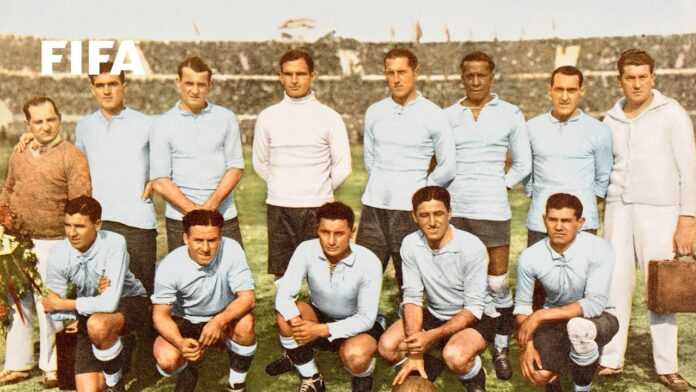Here Is The Easy Money-Making Trick Everyone Is Talking About! Learn More Here!
Every four years, nations from around the globe come together to compete for the coveted FIFA World Cup trophy. But have you ever wondered about the history behind this global phenomenon? Let’s take a journey back in time to explore the significance of Uruguay hosting the inaugural FIFA World Cup in 1930.
- 5 Strong Countries That Have Never Won the FIFA World Cup
- Nigeria’s FIFA World Cup Absence: Which Year Did They Not Qualify?
Selection of Uruguay
Uruguay, a small South American country, was chosen as the host nation for the first-ever World Cup for several compelling reasons. Firstly, Uruguay had a rich footballing history and was one of the most successful teams of that era. They had won back-to-back Olympic gold medals in 1924 and 1928, demonstrating their dominance in international football.
Another crucial factor in Uruguay’s selection was the desire for South American unity. The football associations of Argentina and Uruguay proposed the idea of a global football tournament to FIFA, the international governing body for football. This proposal aimed to strengthen the bonds between nations and promote peace and understanding through sport.
Furthermore, 1930 marked the centennial celebration of Uruguay’s independence. The country was eager to showcase its progress and cultural heritage to the world. Hosting the inaugural World Cup was seen as an opportunity to put Uruguay on the map and demonstrate its ability to organize a successful international event.
Legacy of Uruguay’s Hosting
The decision to host the first World Cup in Uruguay laid the foundation for the tournament’s future success. The inaugural tournament, held in the capital city of Montevideo, witnessed an enthusiastic response from both players and spectators. Thirteen teams from four continents participated, showcasing the global appeal of the sport.
Uruguay’s hosting of the World Cup set the standard for future tournaments. The matches were played in impressive stadiums, including the iconic Estadio Centenario, which was purpose-built for the event. The tournament also introduced innovations such as the use of floodlights for night matches and the adoption of a knockout format.
Additionally, Uruguay’s triumph in the tournament further elevated the country’s status in the footballing world. The Uruguayan team emerged victorious, defeating Argentina in the final and securing their place in history as the first-ever World Cup champions. This victory solidified Uruguay’s reputation as a footballing powerhouse and inspired future generations of players.
The Global Phenomenon
The success of the inaugural World Cup in Uruguay paved the way for the tournament’s growth and global appeal. Subsequent editions of the World Cup have seen an exponential increase in participation and viewership, with millions of fans tuning in from all corners of the world.
The World Cup has become a platform for nations to showcase their footballing prowess, cultural heritage, and national pride. It transcends borders and unites people from diverse backgrounds, fostering a sense of camaraderie and friendly competition.
Today, the FIFA World Cup is not just a sporting event; it is a cultural phenomenon. It captivates audiences worldwide, ignites passion and excitement, and creates lasting memories for players and fans alike. The tournament has evolved into a global celebration of football, showcasing the beautiful game’s universal appeal.
Conclusion
The decision to host the inaugural FIFA World Cup in Uruguay in 1930 was a significant moment in the history of the tournament. Uruguay’s selection as the host nation, driven by their football success, the desire for South American unity, and the country’s centennial celebration, laid the foundation for the global phenomenon that the World Cup has become today.
This article was updated 6 months ago
